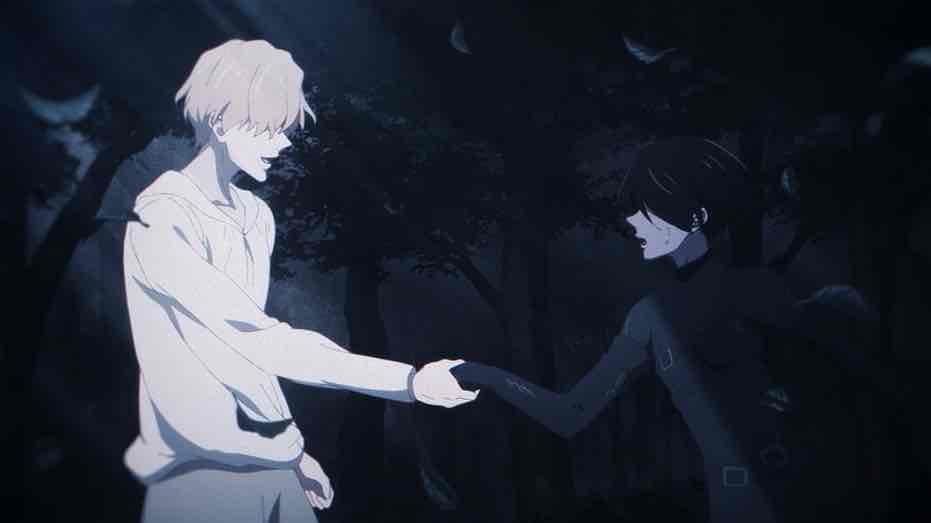 Let me say, first of all, that I have no idea what happened there are the end. James Tyrell, who was actually Henry V, was actually Richard? Obviously that’s not literally true but I have no idea what allegory the mangaka (if this was even adapted and not an original ending) was going for there. It’s a perfect example of the extraneous poppycock this series keeps dredging up to muddy the waters of what was already a fascinating story in real life. It’s a different sort of ridiculous than Shakespeare’s – and I would argue a less insidious sort – but ridiculous it is just the same.
Let me say, first of all, that I have no idea what happened there are the end. James Tyrell, who was actually Henry V, was actually Richard? Obviously that’s not literally true but I have no idea what allegory the mangaka (if this was even adapted and not an original ending) was going for there. It’s a perfect example of the extraneous poppycock this series keeps dredging up to muddy the waters of what was already a fascinating story in real life. It’s a different sort of ridiculous than Shakespeare’s – and I would argue a less insidious sort – but ridiculous it is just the same.
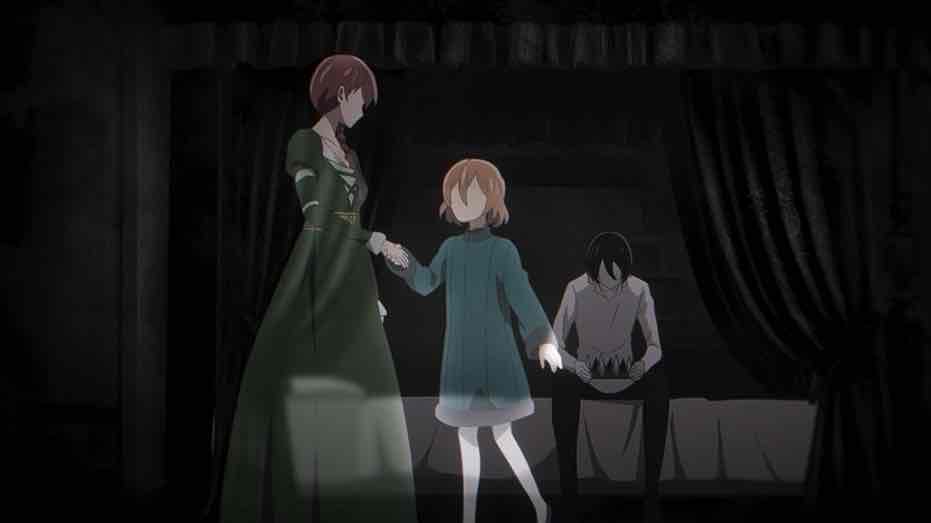 All in all though, that was actually a pretty good final episode. It even had some animation – certainly the most we’ve seen since the premiere. And if you could slice through all the nonsense there was something relevant and even moving at the core of the it. Focusing on Catesby at the end was a good idea – ever-loyal and true he – because disloyalty is at the heart of this entire saga. It was the theme of Richard’s III’s life (in both directions) and the soundtrack of the era.
All in all though, that was actually a pretty good final episode. It even had some animation – certainly the most we’ve seen since the premiere. And if you could slice through all the nonsense there was something relevant and even moving at the core of the it. Focusing on Catesby at the end was a good idea – ever-loyal and true he – because disloyalty is at the heart of this entire saga. It was the theme of Richard’s III’s life (in both directions) and the soundtrack of the era.
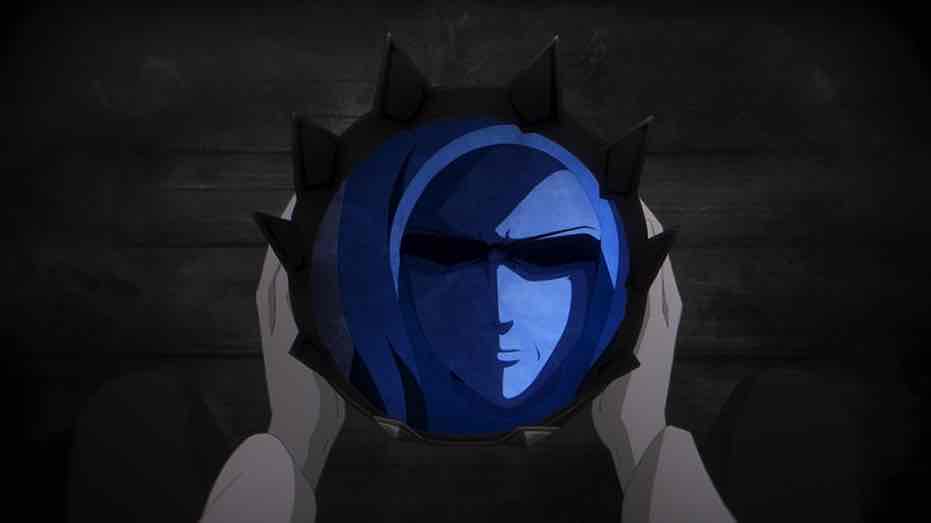 In this context Catesby was the one who was with Richard from the beginning. In reality I don’t believe he and Richard ever met in childhood, though he did stay loyal to his king to the end. Which is notable as he was Hastings’ man, referred to Richard by Edward’s closest friend and confidante. Even Ricardians have a hard time defending Richard’s premeditated murder of Hastings – and indeed there’s some evidence that Richard himself was disgusted and dismayed by it.
In this context Catesby was the one who was with Richard from the beginning. In reality I don’t believe he and Richard ever met in childhood, though he did stay loyal to his king to the end. Which is notable as he was Hastings’ man, referred to Richard by Edward’s closest friend and confidante. Even Ricardians have a hard time defending Richard’s premeditated murder of Hastings – and indeed there’s some evidence that Richard himself was disgusted and dismayed by it.
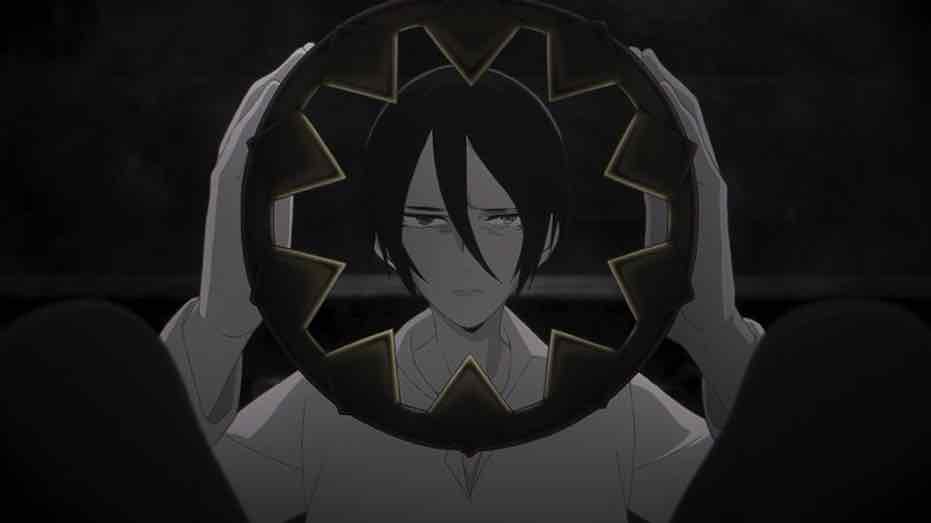 As to the other great lords present at Bosworth Field, the depiction is pretty accurate in fact. Richard and Northumberland (Henry Percy, 4th Earl) had a very complicated relationship. Edward IV effectively made him subservient to Richard in his native North of England, though still the second-most powerful lord in the region. Richard took care to foster good relations with Percy and treated him with deference, but there clearly times Northumberland resented the much-loved Duke of Gloucester’s popularity in the region. Still, to this day his role in the treason at Bosworth Field is unclear – his men were the reserves, and it’s possible Richard (who had a sizable numerical advantage) simply never called them into battle.
As to the other great lords present at Bosworth Field, the depiction is pretty accurate in fact. Richard and Northumberland (Henry Percy, 4th Earl) had a very complicated relationship. Edward IV effectively made him subservient to Richard in his native North of England, though still the second-most powerful lord in the region. Richard took care to foster good relations with Percy and treated him with deference, but there clearly times Northumberland resented the much-loved Duke of Gloucester’s popularity in the region. Still, to this day his role in the treason at Bosworth Field is unclear – his men were the reserves, and it’s possible Richard (who had a sizable numerical advantage) simply never called them into battle.
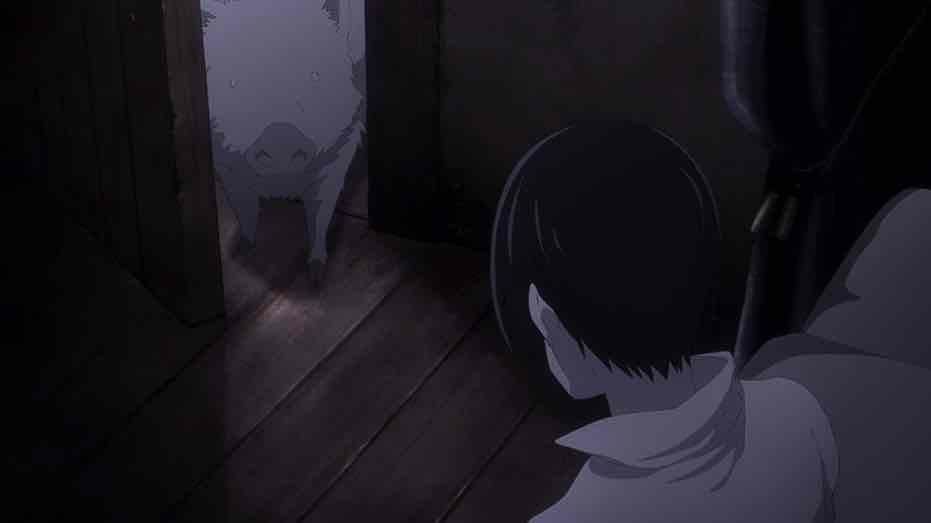 The role of the other two great lieutenants is not remotely ambiguous. Lord Stanley, a habitual turncoat, was indeed Henry Tudor’s stepfather and indisputably turned his coat during the battle. Richard in fact probably didn’t trust Stanley to fight at his side, but it may have been a case where “keep your friends close and your enemies closer” would have been the prudent course. As for Lord Howard, he was at Richard’s side, and for good reason. Richard trusted him implicitly, and Howard never betrayed that trust. In the Roses era, that was exceptionally rare.
The role of the other two great lieutenants is not remotely ambiguous. Lord Stanley, a habitual turncoat, was indeed Henry Tudor’s stepfather and indisputably turned his coat during the battle. Richard in fact probably didn’t trust Stanley to fight at his side, but it may have been a case where “keep your friends close and your enemies closer” would have been the prudent course. As for Lord Howard, he was at Richard’s side, and for good reason. Richard trusted him implicitly, and Howard never betrayed that trust. In the Roses era, that was exceptionally rare.
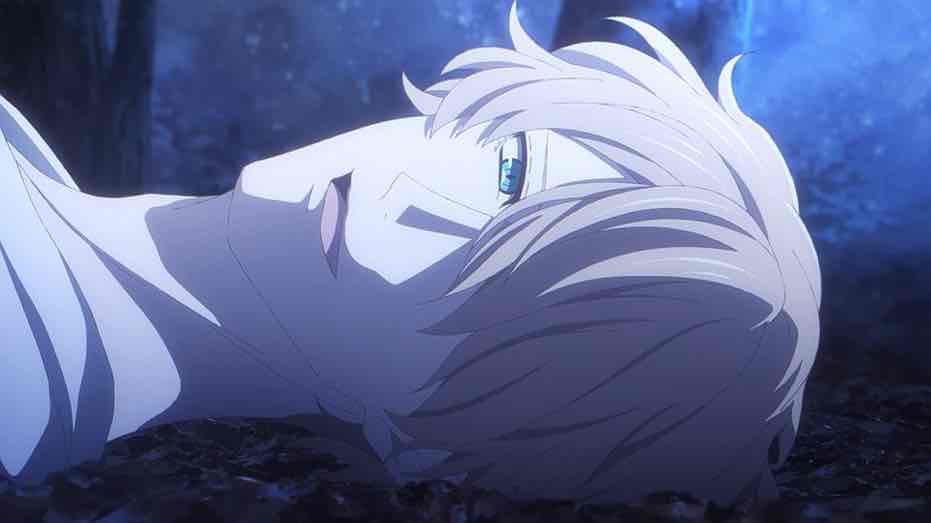 If you were expecting a “my kingdom for a horse” moment you were disappointed – Kanno wisely leaves that old saw to the Bard’s fevered fantasies. Not that horses weren’t involved, and indeed Richard was said to have been riding a white charger that fateful day. As for Henry Tudor, he wasn’t the sort of king who would commit himself to battle. He was a con man to the end, and unlike Richard never proved his mettle on the battlefield. The good guys rarely win in history, and whatever you believe about Richard, Henry Tudor’s nature doesn’t hold up well when the fog of Tudor propagandists is cleared away.
If you were expecting a “my kingdom for a horse” moment you were disappointed – Kanno wisely leaves that old saw to the Bard’s fevered fantasies. Not that horses weren’t involved, and indeed Richard was said to have been riding a white charger that fateful day. As for Henry Tudor, he wasn’t the sort of king who would commit himself to battle. He was a con man to the end, and unlike Richard never proved his mettle on the battlefield. The good guys rarely win in history, and whatever you believe about Richard, Henry Tudor’s nature doesn’t hold up well when the fog of Tudor propagandists is cleared away.
 Am I sorry I stuck it out for 24 episodes, as spotty as Baraou no Souretsu was? No, not at all – warts and all it still focused on one of the most fascinating periods in history (it didn’t bewitch George R.R. Martin without good reason). And it did, oddly in light of its absurdities, present a Richard that was probably closer to the real man than that of established historians and Shakespeare’s caricature. I wish this had been a real work of animation rather than effectively a manga slideshow with a cast of no-faces. I wish Kanno has dispensed with the more extreme affectations and sailed closer to the wind where realism was concerned. But since this is probably the only War of the Roses anime we’re going to get, I appreciate getting the chance to see it.
Am I sorry I stuck it out for 24 episodes, as spotty as Baraou no Souretsu was? No, not at all – warts and all it still focused on one of the most fascinating periods in history (it didn’t bewitch George R.R. Martin without good reason). And it did, oddly in light of its absurdities, present a Richard that was probably closer to the real man than that of established historians and Shakespeare’s caricature. I wish this had been a real work of animation rather than effectively a manga slideshow with a cast of no-faces. I wish Kanno has dispensed with the more extreme affectations and sailed closer to the wind where realism was concerned. But since this is probably the only War of the Roses anime we’re going to get, I appreciate getting the chance to see it.


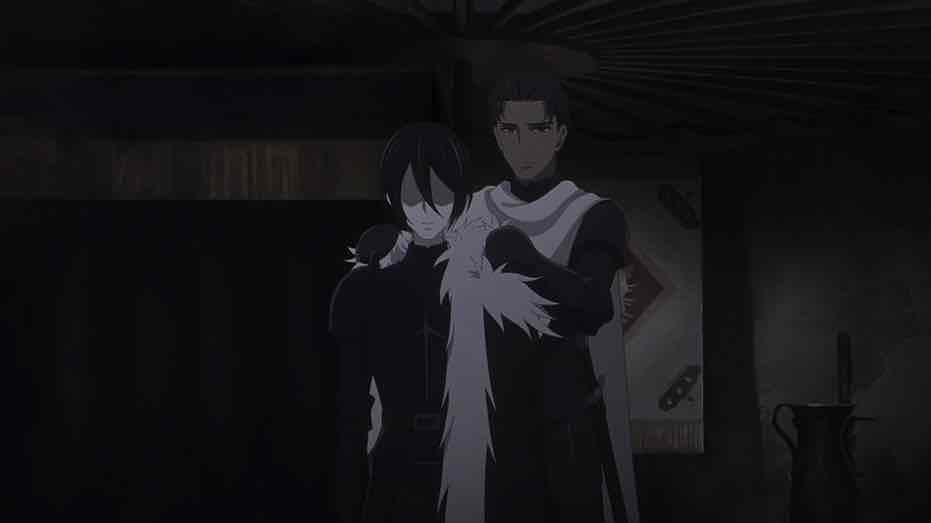
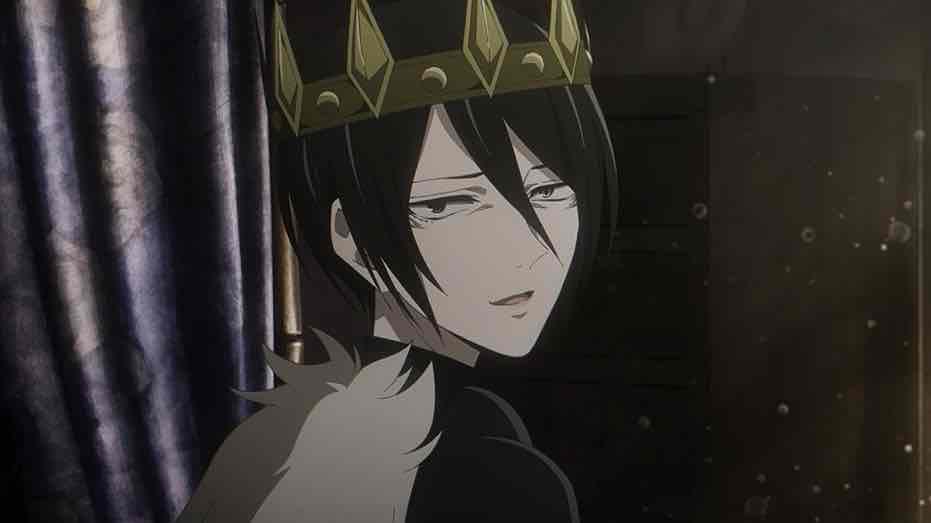
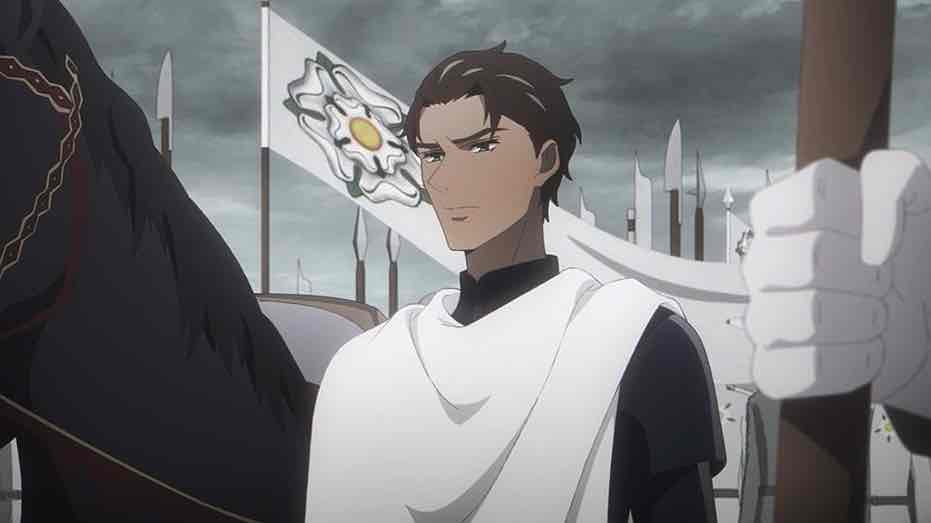
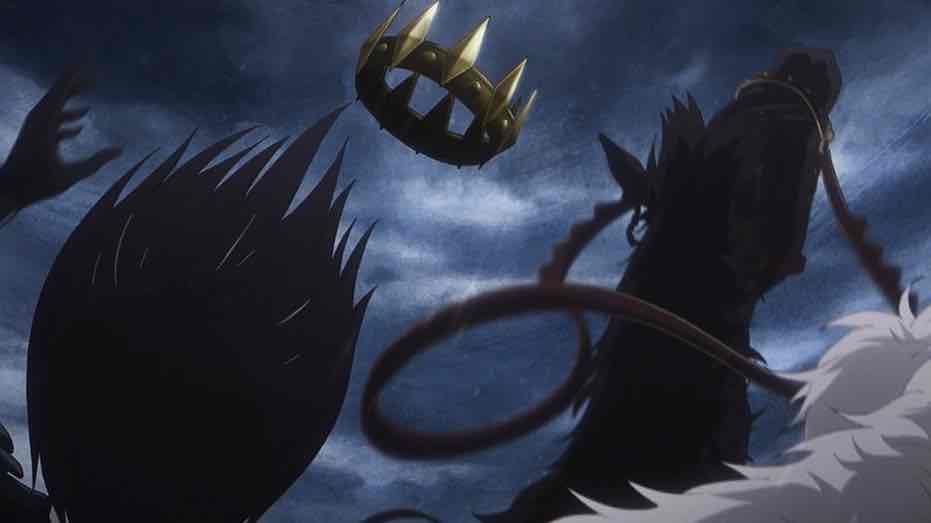
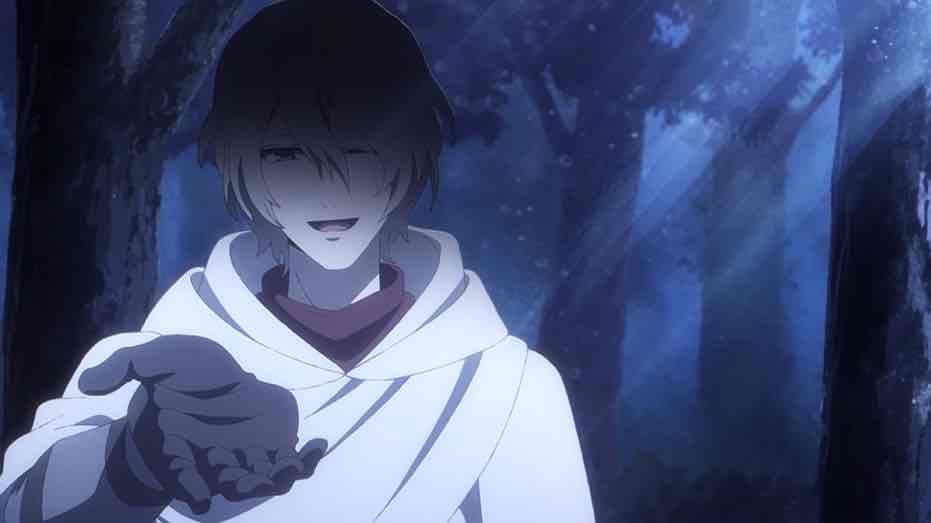
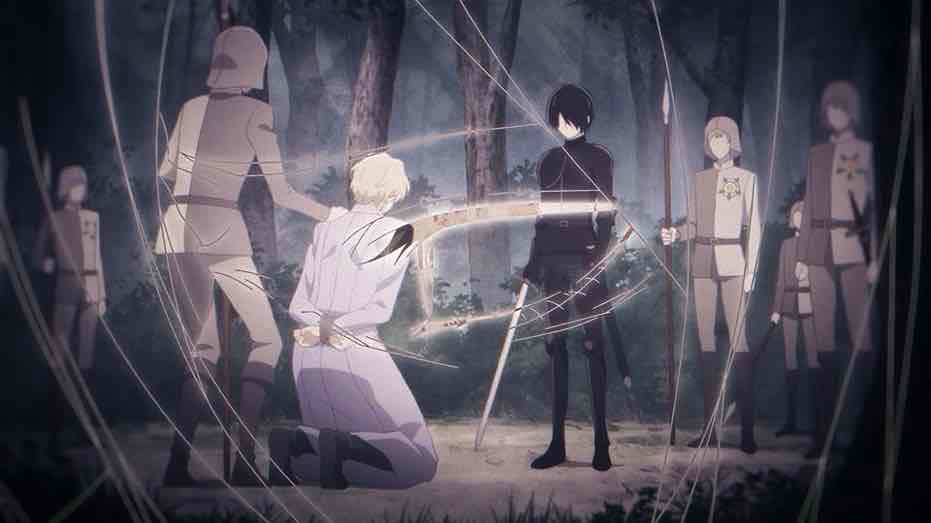
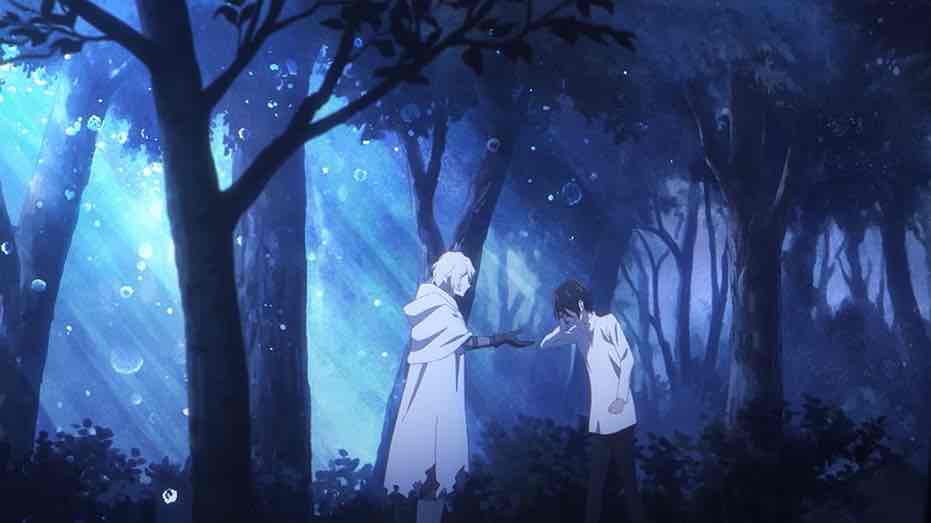


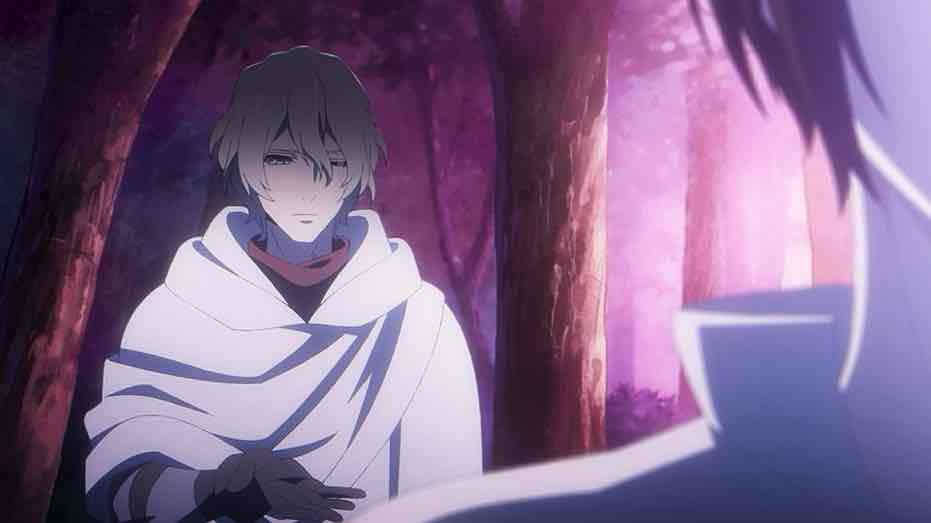
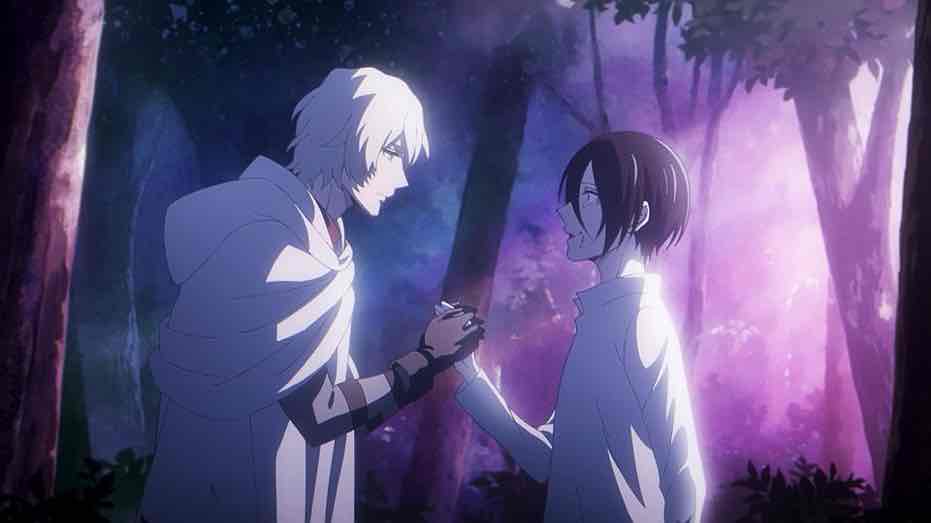
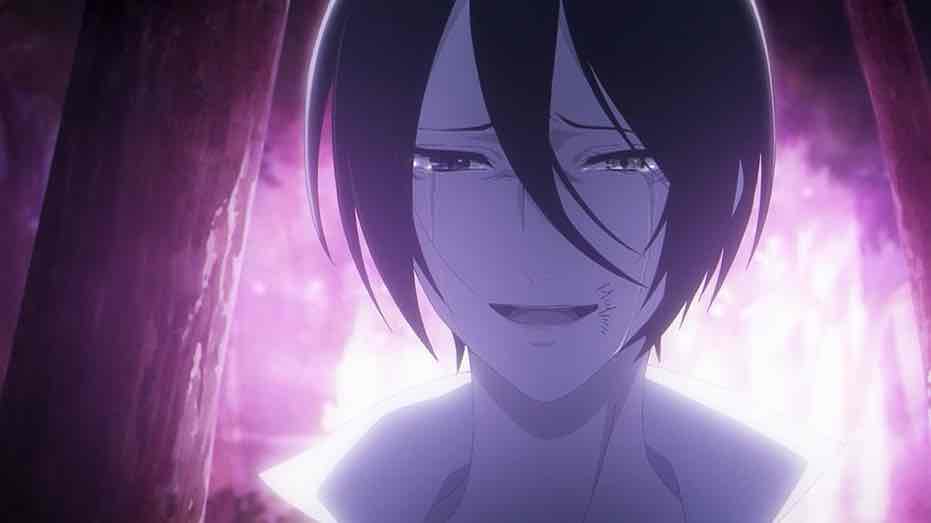
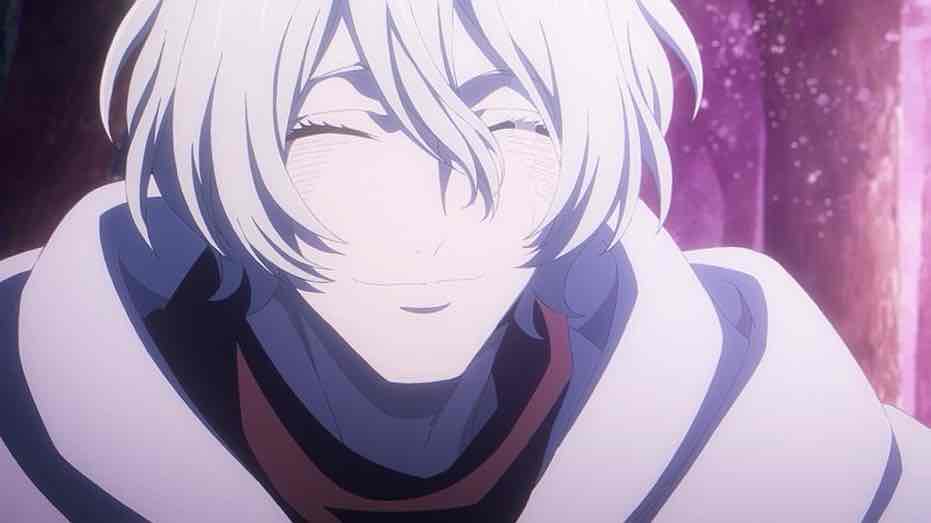

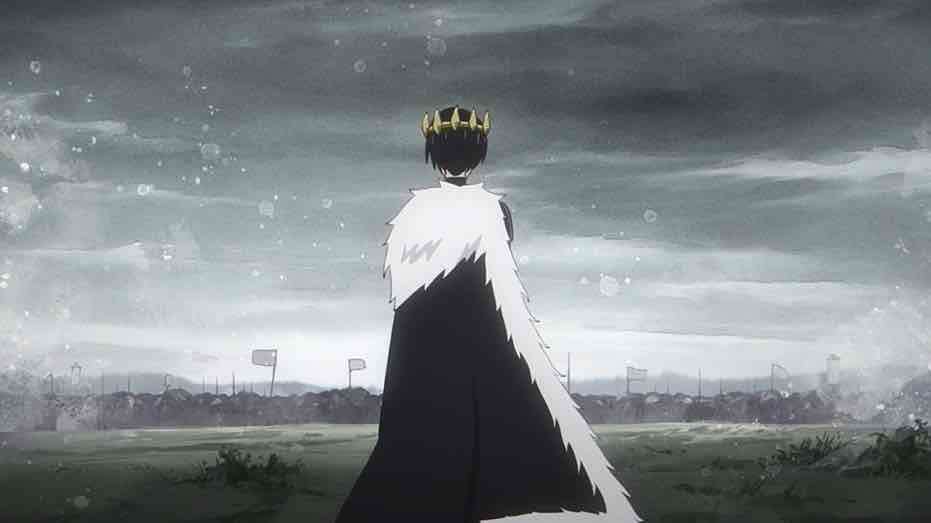
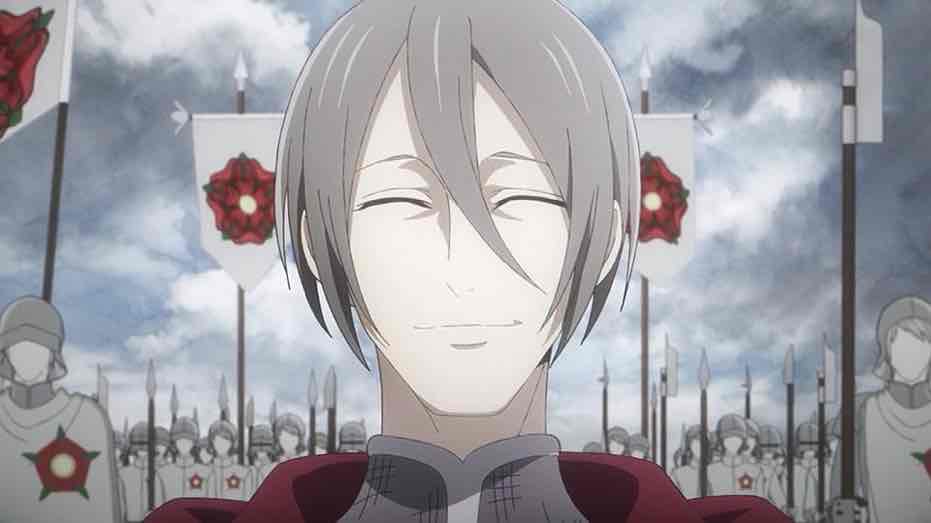
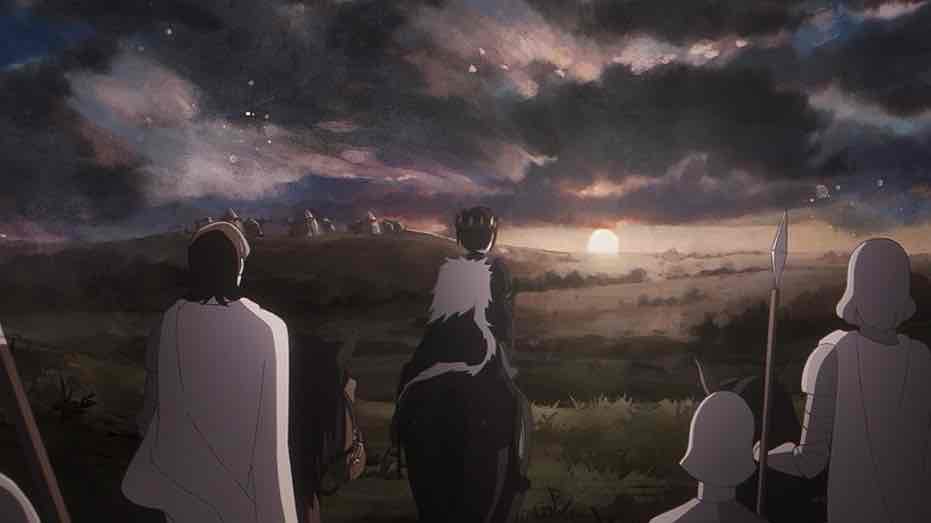
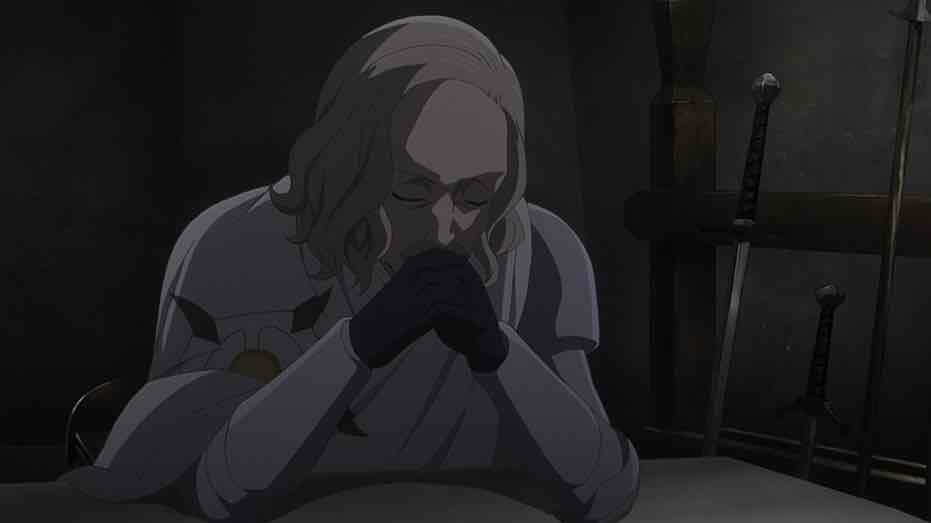
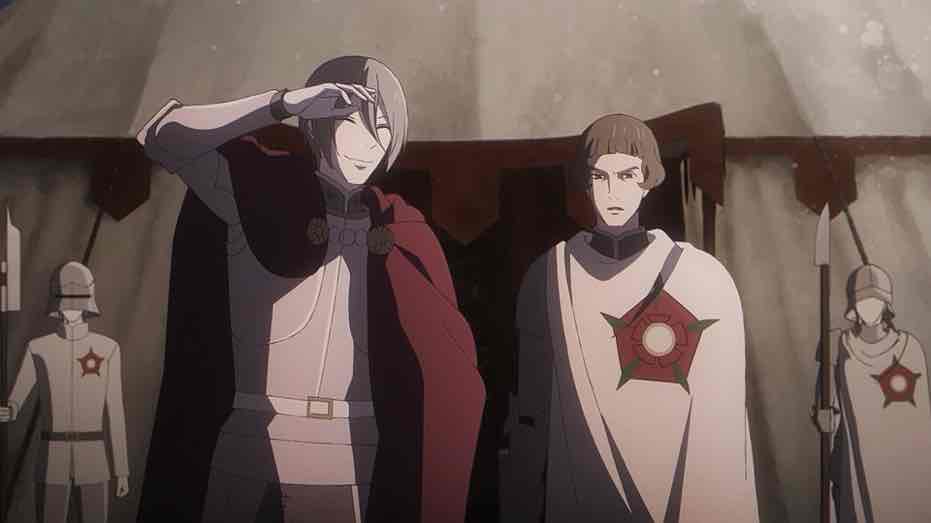
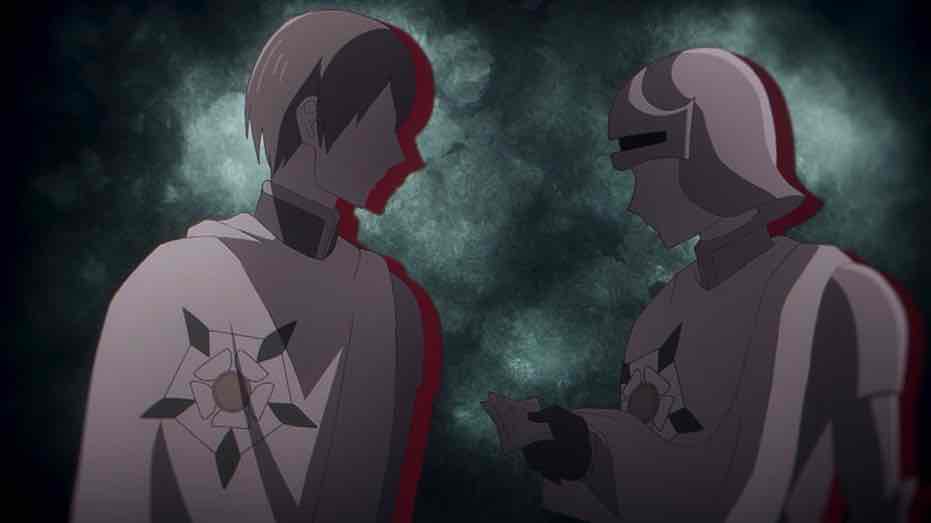
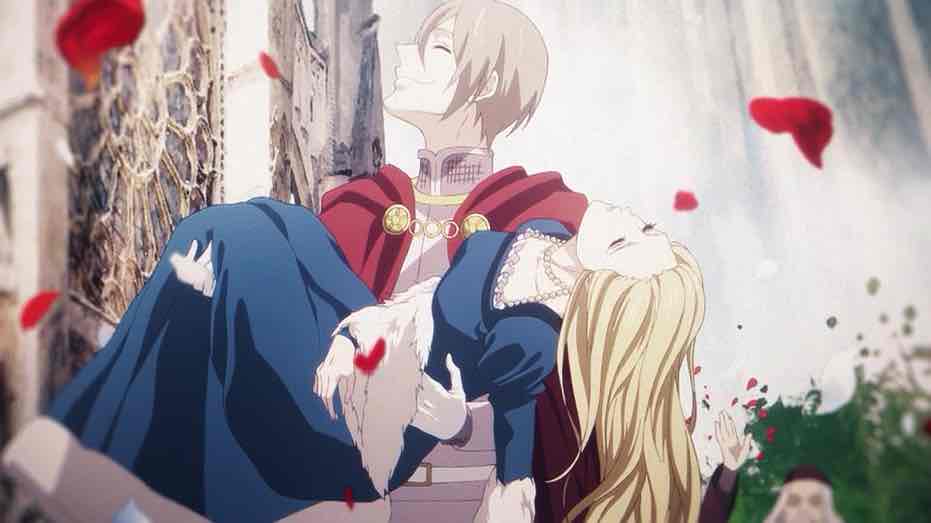
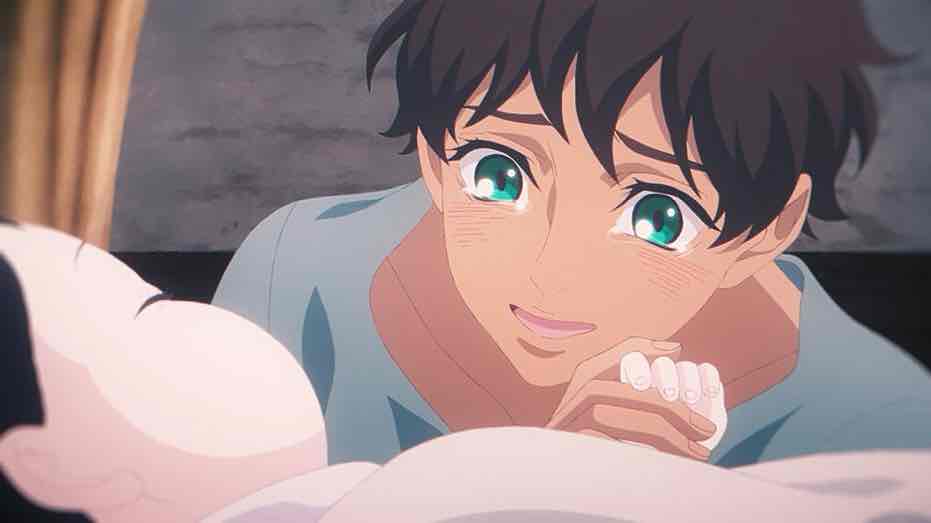
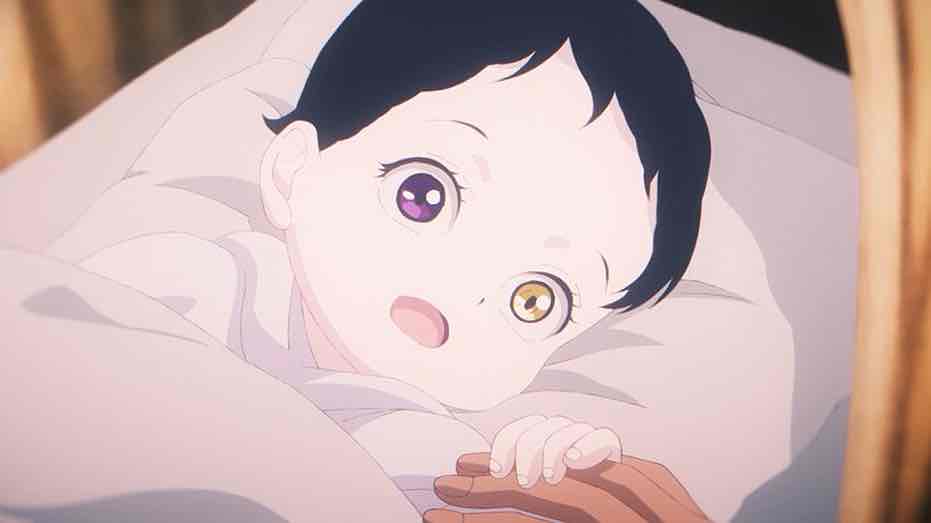

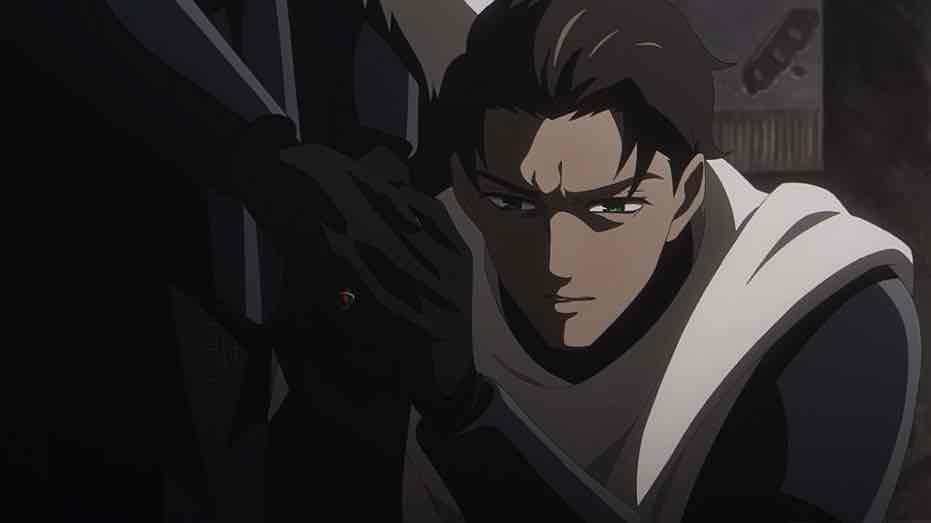
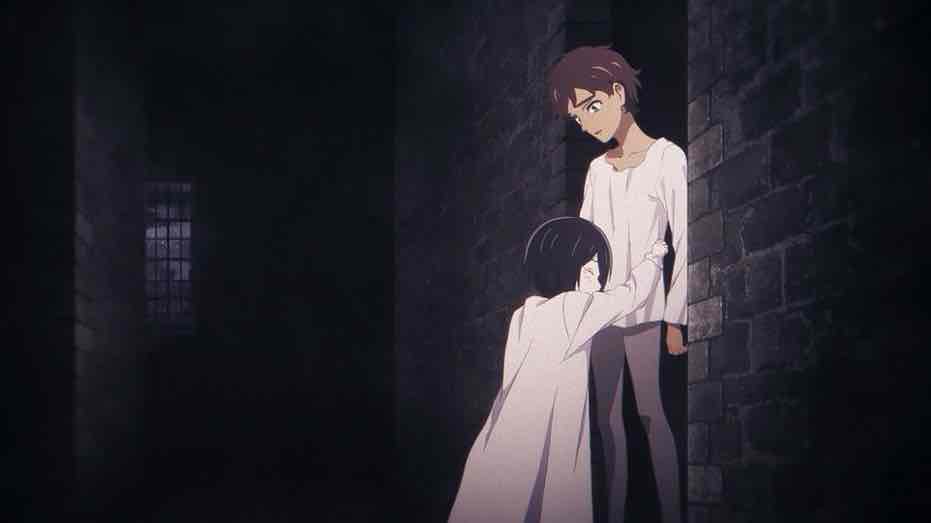
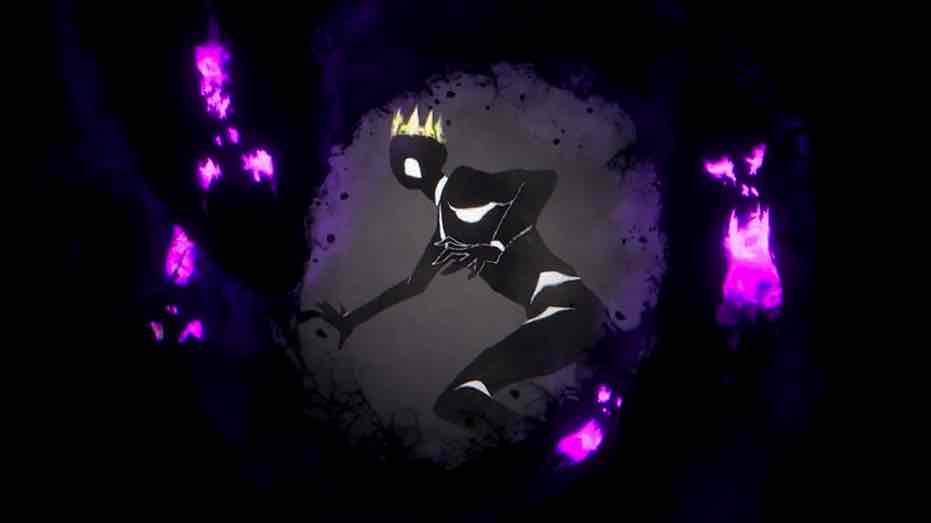
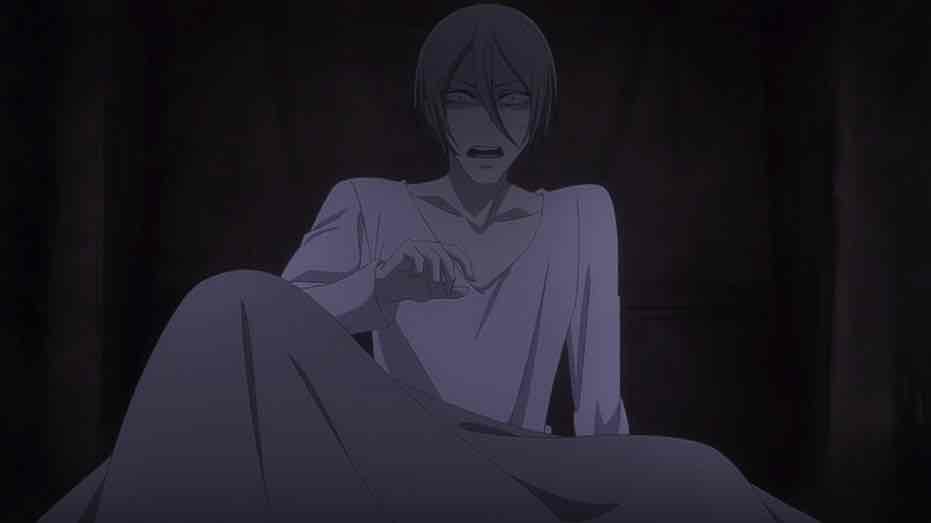
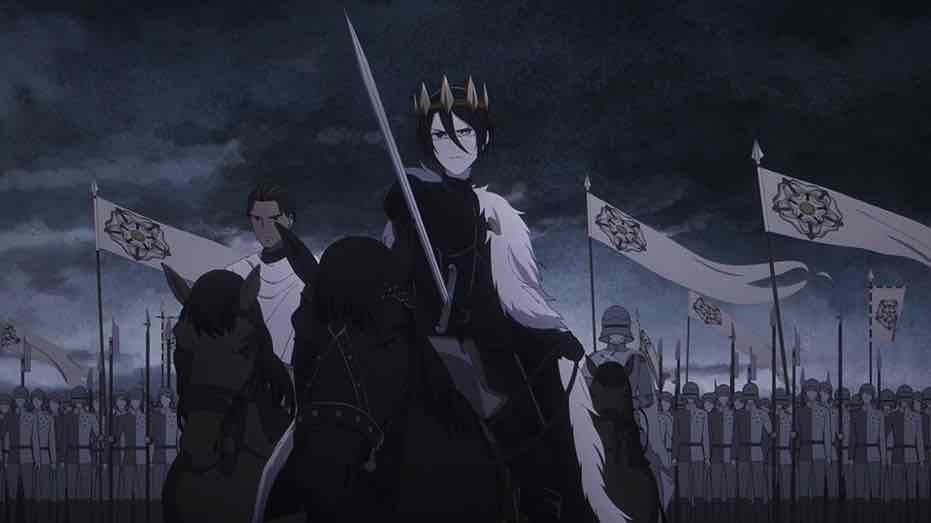
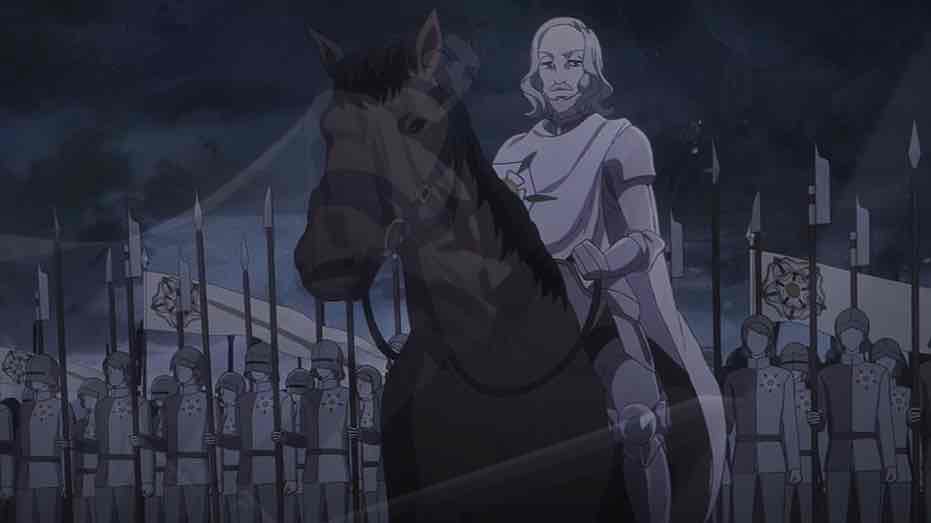
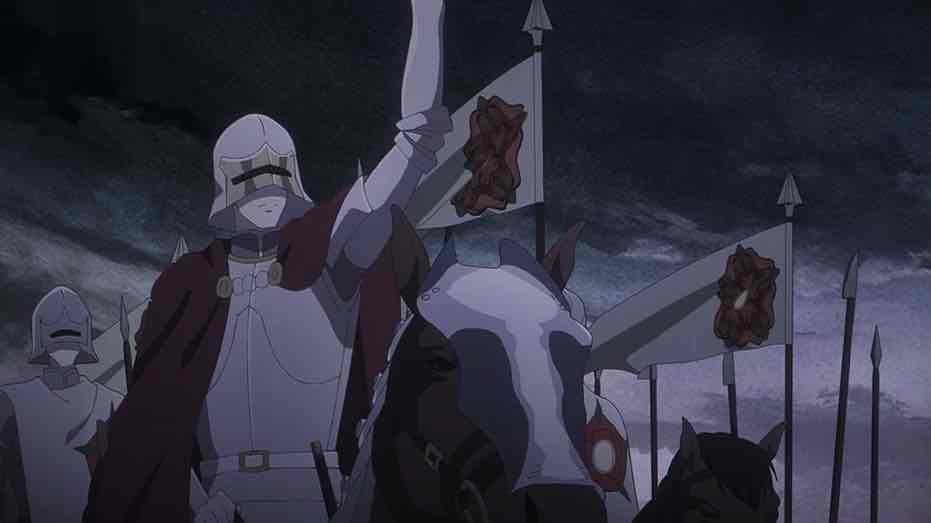
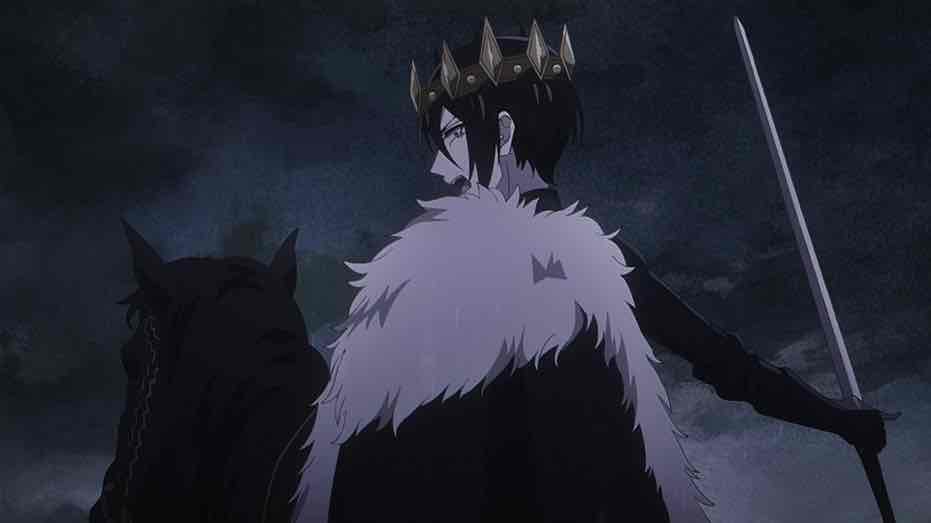
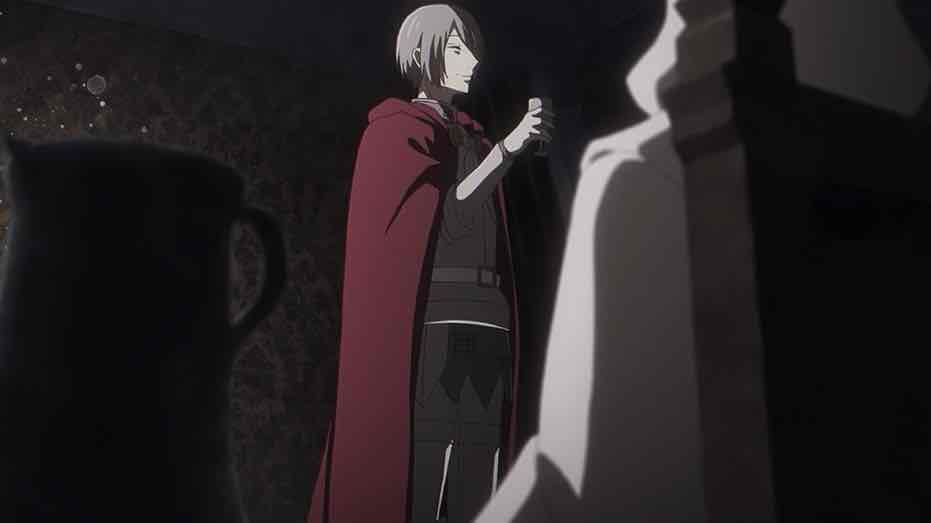
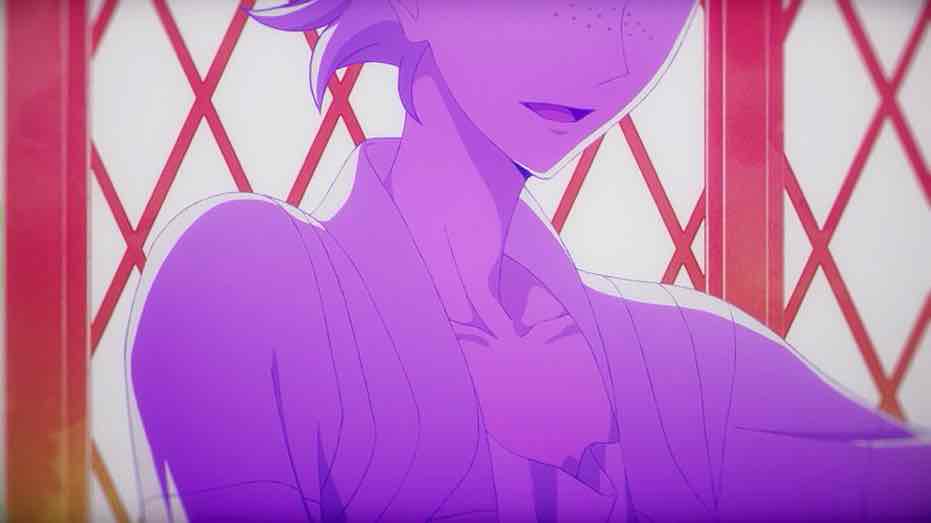
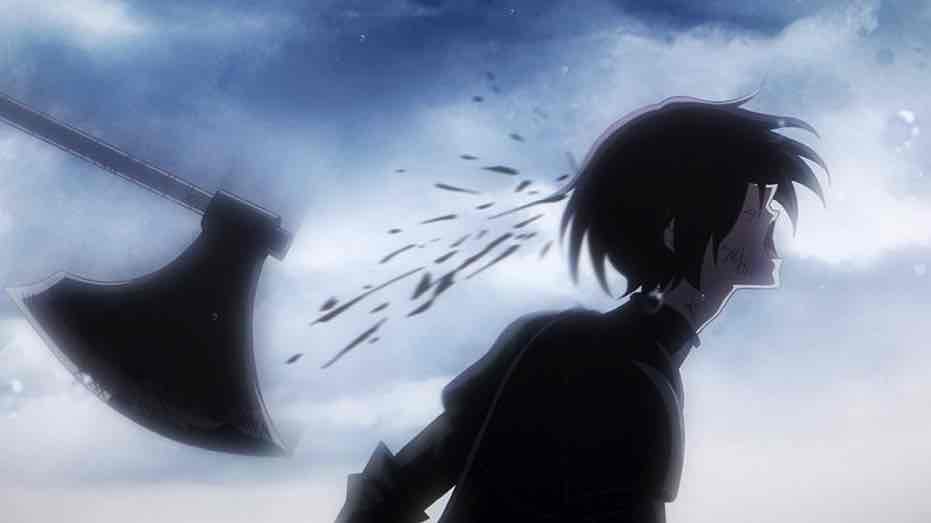
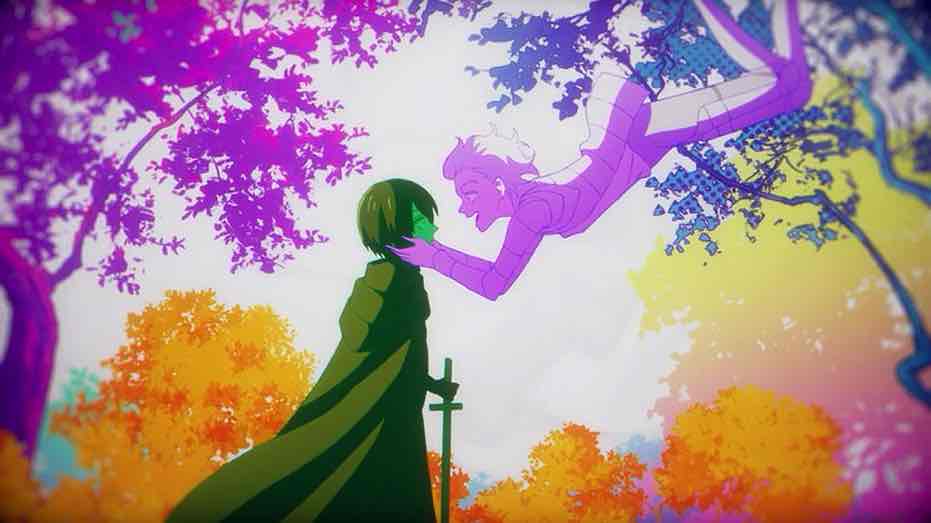
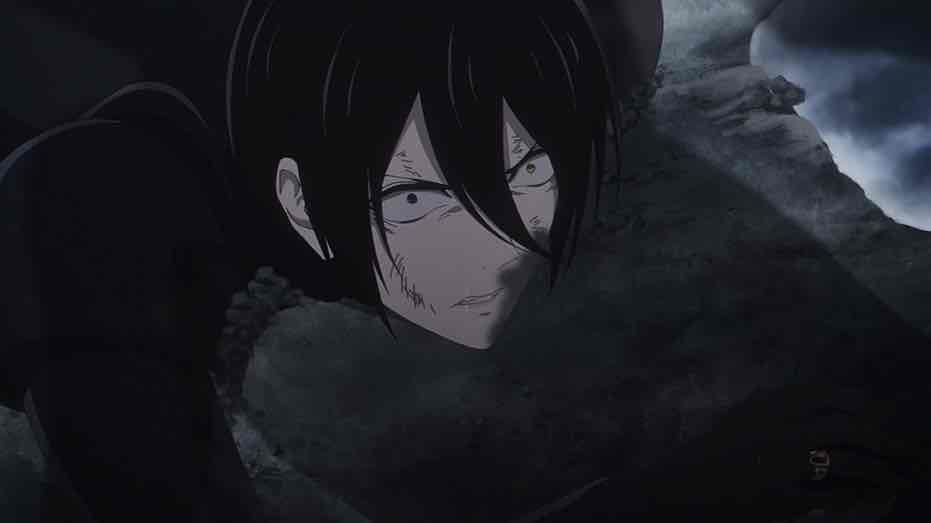
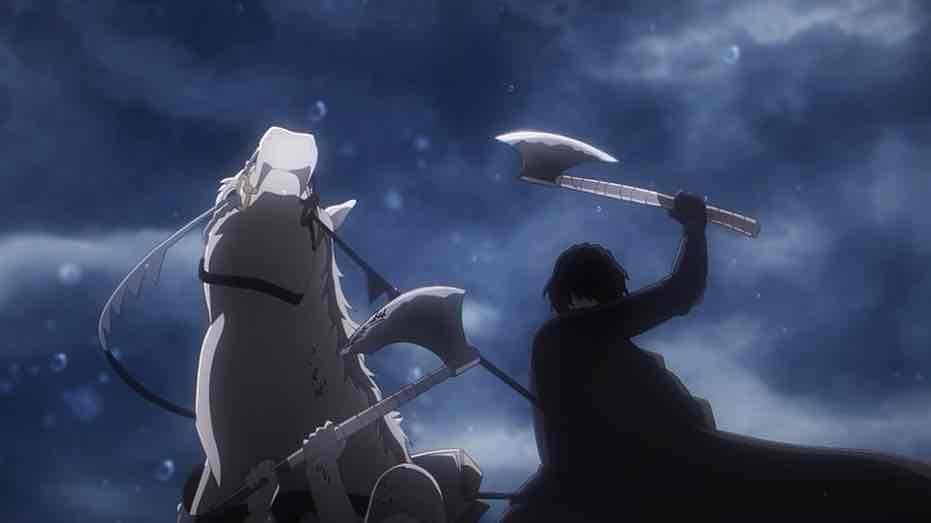
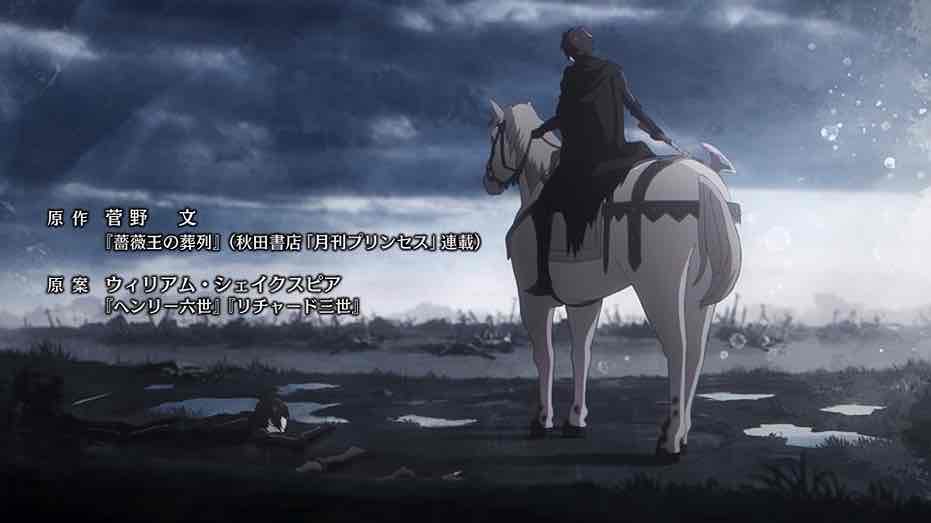
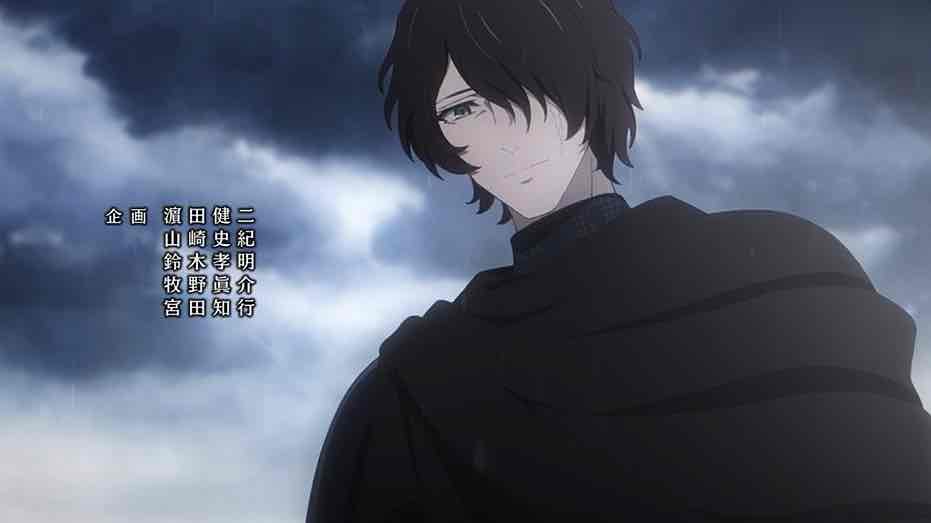
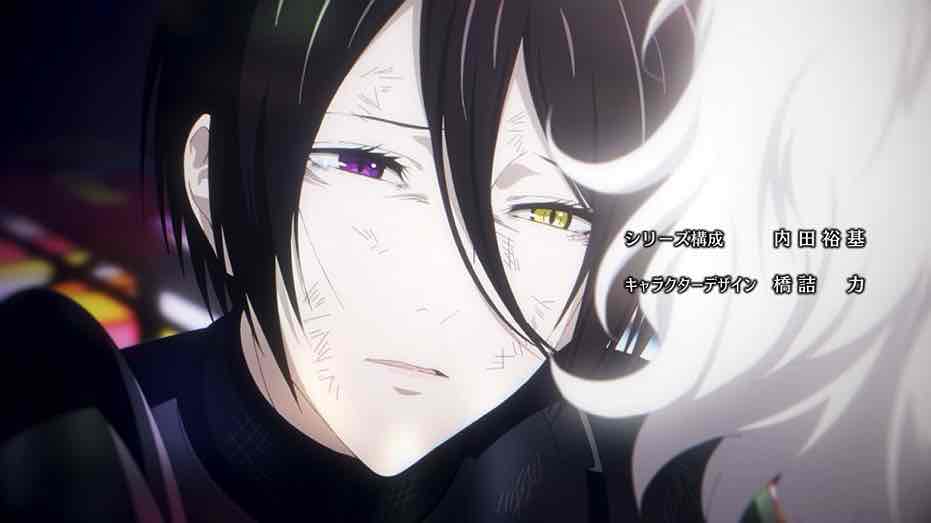
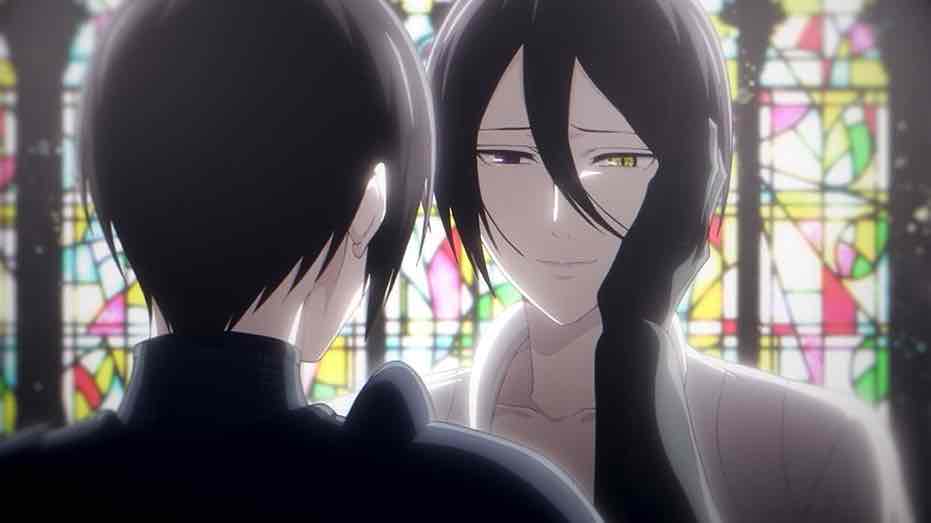

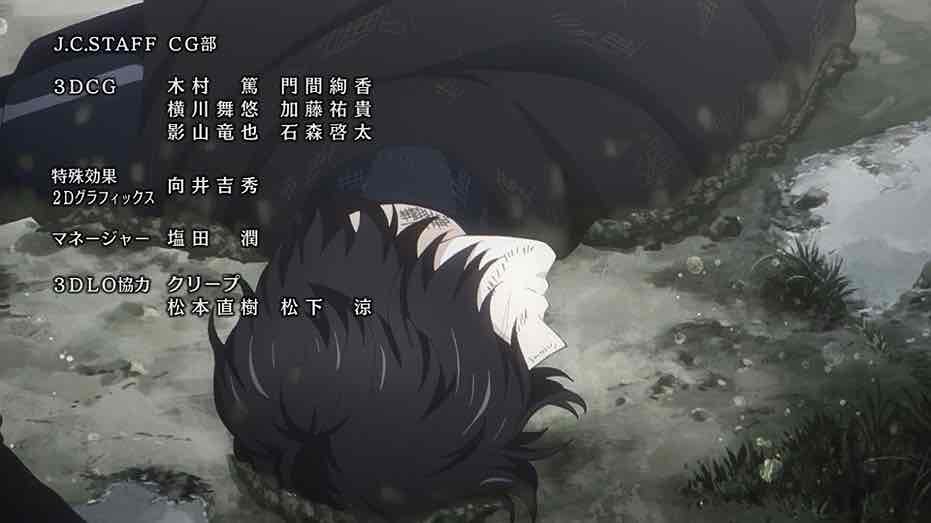
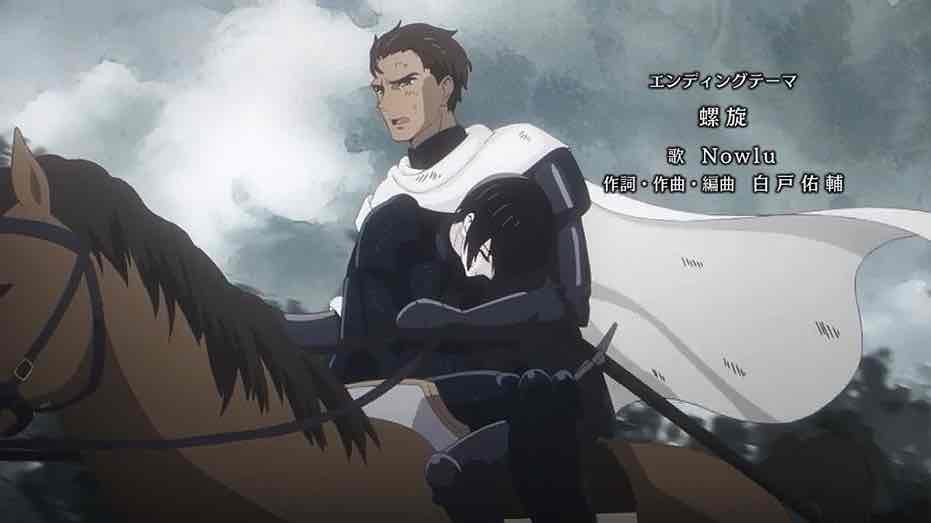

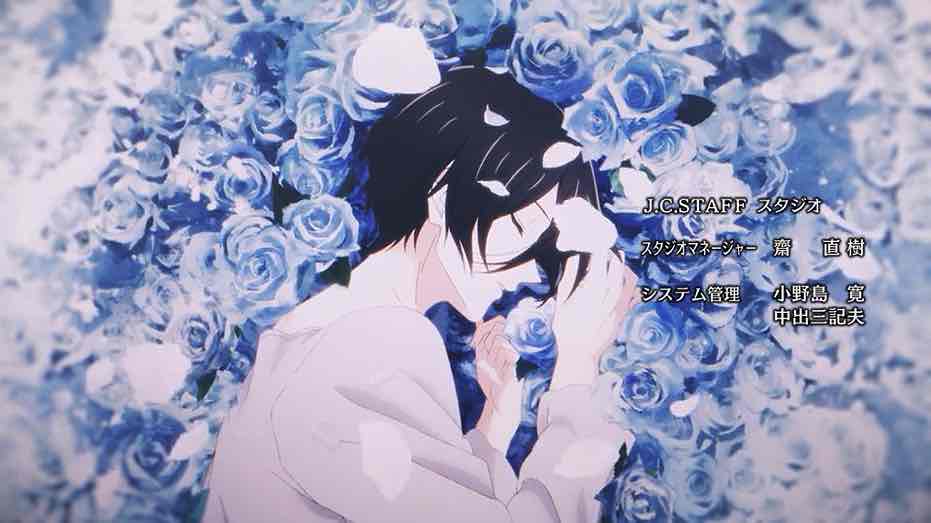

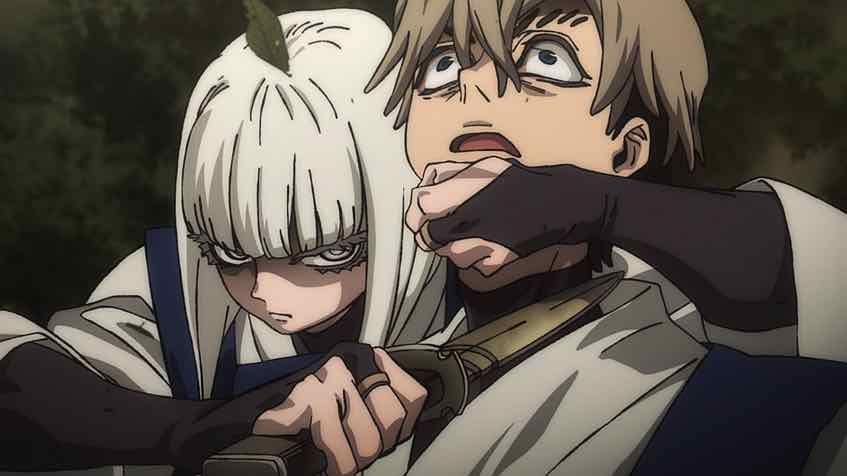

Collectr
June 29, 2022 at 5:03 amThis was hard to parse, but I’ll try. Richard is dehorsed and overwhelmed on the battlefield and given a grievous head wound with an axe. Henry/Tyrell wants to kill Richard himself, so he feeds Henry Tudor false information about the horse Richard is riding and seeks the king out on the battlefield. Richard is hallucinating from his head wound. He sees Joan of Arc again, and he believes Henry/Tyrell is actually his “other half: Henry/Tyrell wounds the king mortally. Catesby picks Richard up and carries him off. Catesby begs him not to die, but it is too late. Richard “sees” the people he cared for – his father, Anne, Anne’s son, Buckingham, even Henry VI, all carrying white roses – before consigning himself to “sleep”, that is, death. That’s as close as I can get.
Joan of Arc has been a symbol of defying gender conventions since the start of the story, and her feelings about herself in the story – self-loathing – are meant to mirror Richard’s about himself. I wonder if the mangaka’s interpretation of Joan owed something to Leonard Cohen:
She said, “I’m tired of the war.
I want the work I had before.
A wedding dress or something white
to wear upon my swollen appetite.”
Cohen’s Joan ultimately embraces her fate in the fire, as Richard embraces his death in battle.
There is, of course, lots of piffle, even in the smaller details. Henry Tudor sends a double into battle… This is a trope to establish villainy that goes back to the movie “Cleopatra”, if not before, when Antony cuts through the enemy ranks only to find out that “Octavian” is a body double. It was junk history then – Octavian was in camp, felled by illness, and Agrippa led the troops openly – and it’s junk history here too.
In all, the story affords Richard more nobility of character, and a more tragic arc, than Shakespeare, while not attempting to whitewash him. If only the mangaka had stuck to that! There’s a real tragedy in the history of Richard III. Perhaps someone will write it someday.
Guardian Enzo
June 29, 2022 at 8:06 amWe can only hope.
What’s so indisputable that even conventional historians struggle to refute it is that the Yorkists were the most progressive rulers England had ever seen, by a long stretch. They were connected to the common people and their policies led to a better standard of living for the peasantry and more wealth for merchants than England would see for centuries. They instituted many of the legal protections that still exist today. The Tudors reversed almost all of that and were generally a disaster, especially the first couple of them. And of course the Lancasters had been a disaster too.
Princess Usagi
June 30, 2022 at 9:34 amI was under the impression that the last scene with Tyrrell=Henry=Richard was an allegory of Richard finally coming to embrace himself in the way he was embraced by past lovers and not so much a literal identity reveal. I actually thought that poignant-having spent the whole series running away from himself into the “warmth” of others, he finally shared warmth with own self at the very end, in a moment of self-acceptance.
The show definitely was ridiculous-but I enjoyed it as a show where I could turn some of the analytical part of my brain off and just simply enjoy the melodrama. While Shakespeare’s telling triumphed with the more beautiful language and witticisms, Baraou no Souretsu’s rendering gave the characters more life and were more interesting to read/watch about. I feel like I will never see Richard III the same again after Baraou no Souretsu, for better or for worse.
Guardian Enzo
June 30, 2022 at 1:47 pmIf it was Shakespeare who shaped how you saw him before, it pretty much has to be for better.
I suppose that interpretation on the ending makes sense. Honestly by that point the whole thing was so over the top that I really couldn’t take any of it too seriously.
Marty
July 1, 2022 at 6:50 amIf I understand the nature of propaganda, it is Simply not enough to lionize Henry, but Richard must be demonized as well, so it if difficult to separate fact from fiction in regards of credit for achievements like the English Navy. I’m assuming that much of the credit to civil and military accomplishments retroactively was given to Henry and his successors, whether they deserved it or not.
Something I’m curious about is, does the fact that the Yorkist line was fairly progressive towards the peasantry and merchant class mean that the English Civil War, and the reign of Cromwell, was avoidable? If so, that’s an insane “what if” when it comes to English history (that and the relations with Spain).
Is the Tudor propaganda coup the greatest in Western history? Because for the life of me i struggle to think of a line of monarchs so undeservingly well-regarded by Historians for so many generations.
Guardian Enzo
July 1, 2022 at 9:41 amIt may very well be. They were as great at manipulating historical opinion as they were awful at providing good governance. They were very much ahead of their time in thinking about such matters.
I think what you see with the York line is a very early example of established financial interests conspiring to put down a government that was in their view hostile to them. All of the York patriarchs were flawed in their own way, but they shared a general commitment to flattening out the class curve in England substantially. The Tudors are a direct extension of the Lancastrians, but they raised the stakes in every way. The Lancaster line was clumsy and pretty much just about pure greed and patronage, enriching themselves and their friends with no concern for the consequences. The Tudors always had a long game in mind. – entrenching policies that enriched the nobility at the expense of the peasantry, and manipulating the historical record.
I don’t think we can say if the English civil was would have happened in the Yorkists had remained in power – it’s purely hypothetical. But I think that we can see for sure that the fateful moment was Edward marrying into the Woodvilles (a dynamic GRRM captured so brilliantly). That family was a a disaster and the problems of the York kings were largely attributable to the trouble they caused. And they were intrinsic to Henry Tudor’s rebellion – it never would have happened without their support and indeed leadership.
51 Game Team
February 27, 2025 at 8:49 amWhat a journey this series has been! I really appreciated your insights in the review. The character development in the final episode was so well done, and it wrapped up the story beautifully. Definitely left me with a mix of emotions! Thanks for sharing your thoughts on it!